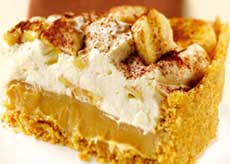Love actually《真爱至上》视频精讲之四
(单词翻译:单击)
影片对白
 Juliet: Banoffee pie?
Juliet: Banoffee pie?
Mark: No, thanks.
Juliet: Thank god, you would have broken my heart if you'd said yes.
Mark: Right, well. Lucky you.
Juliet: Can I come in?
Mark: Er, yeah! Well, I'm a bit busy.
Juliet: I was just passing and I thought we might check that video thing out. I thought I might be able to swap1 it for some pie or maybe munchies?
Mark: Actually I was being serious. I don't know where it is. I'll have a look around tonight.
Juliet: Mark, can I say something?
Mark: Yeah.
Juliet: I know you're Peter's best friend and I know you've never particular warmed to me. Look, don't, don't argue. We've never got friendly. But I just wanted to say, I hope that can change. I'm nice, I really am. Apart from my terrible taste in pie and... it would be great if we could be friends.
Mark: Absolutely, absolutely.
Juliet: Great.
 Mark: Doesn't mean we'll be able to find the video, though. I had a real search when you first called and couldn't find any choices so...
Mark: Doesn't mean we'll be able to find the video, though. I had a real search when you first called and couldn't find any choices so...
Juliet: This one says Peter and Juliet's wedding. Do you think we might be on the right track?
Mark: Err2, yeah, well... wow. That- that could be it.
Juliet: Do you mind if I...?
Mark: I've probably taped it over it. Almost everything's episode of west wing on it now. Oh.
Juliet: Oh bingo. That's lovely. Well done you. Oh, that's gorgeous. Thank you so much, Mark. This is exactly what I' was hoping for. I look quit pretty. You've stayed rather close, haven't you? They are all of me.
Mark: Yeah, yeah, yes.
Juliet: But, you never talked to me. You always talk to Peter. You don't like me.
Mark: I hope it's useful. Don't show it around too much. Needs a bit of editing. Look, I got to get a lunch, early lunch. You can just show yourself out, can't you? It's a self- preservation3 thing, you see.
妙语佳句,活学活用
1. Check sth out
意思就是“把……查出来/弄出来”,在此片断中提到的check the video thing out,指的就是“找一下那个video”。那么在我们的日常生活中这个短语要怎么用呢?打个比方:What are you doing here? Well, I'm here to check my bag out.(我来这儿是找我的包的。)再比如:Don't make any haste decisions before we check it out.(在事情调查好之前,先不要果断下结论。)
2. Swap sth for sth
“用……换……”的意思。Can I swap the chocolate for some apples? 我能用苹果换点巧克力吗?我们还要注意到另外一个短语:swap meet,虽然在此片当中没有提到,但是也很重要,指的就是flea market 跳蚤市场。
3. You've never particular warmed to me.
“你从来都没对我热情过”,这句话不能这么翻译,一定要反过来才可以:你一向对我都这么冷淡。举个例子:He's never particular warmed to anybody. 他对谁都那样,冷冰冰的。
4. I had a real search for...
Search for... 指的就是“找……”。有时候我们说 search for 会觉得语言表达得不够生动,为了表示强调,就会说I had a real search for...(我还真是费了好大的力气找了半天呢!)比如:I had a real search for my wallet. But I did that in vain. 我费了好大的劲找我的钱包,但是还是没找到!
5. On the right track
在理解这句话的意思之前,我们要先看一下 track 这个词。通常情况下,track 指的是“路径”的意思,等同于 path。在英文当中我们有这样的表达,be on the right path 正确的道路上/已经有了正确的选择。on the right track 也是同样的意思。在本片断中的 We might be on the right track. 指的就是“我们也许选对了”。
6. Don't show it around.
在这里做“不要到处炫耀”解。show sb. around 常用的意思是“带某人随便转转”。比如:Since this is the first time I'm in the capital of China, would you like to show me around or something? 这是我第一次到北京,你是否愿意带我转转?
文化面面观
Banoffee pie
 Pie 是西方人喜欢的一道美食。它可不止是汉语中的“馅饼”那么简单。在西式糕点中,也有pie的一席之地。Banoffee pie is a dessert made from biscuits, bananas, butter, cream and boiled condensed milk. Its name is a portmanteau (合成词) constructed from the words "banana" and "toffee (太妃糖)".
Pie 是西方人喜欢的一道美食。它可不止是汉语中的“馅饼”那么简单。在西式糕点中,也有pie的一席之地。Banoffee pie is a dessert made from biscuits, bananas, butter, cream and boiled condensed milk. Its name is a portmanteau (合成词) constructed from the words "banana" and "toffee (太妃糖)".
Inventorship of the pie is claimed by Ian Dowding and Nigel Mackenzie of The Hungry Monk4 restaurant in Jevington, East Sussex. They claim to have invented the pie in 1972, and the restaurant's exterior5 bears a plaque6 to that effect. The recipe was never patented, however, and in 1994 a number of supermarkets began selling it as an American pie, leading Dowding and Mackenzie to offer a ?10,000 prize to anyone who could disprove their claim.
There is some discussion over the best spelling for the pie's name; The Hungry Monk preferring "banoffi" where the logical etymological7 spelling would be "banoffee", to correspond with "toffee". Other variations include "banoffy" and "bannofie".
考考你
用今日所学将下面的句子译成英语。
1. 我能用我的铅笔换你的文具盒吗?
2. 我花了好大的劲才找到我的笔记本。
3. 别到处炫耀了,不就是个手机嘛?
Love actually《真爱至上》精讲之三 考考你 参考答案
1. 在临走之前,我想多见见你!
Before I'm moving, I really wanna see much more of you.
2. 我来是要拿走我想要的东西。
I came here to take exactly what I want.
3. 从现在开始,我要努力工作。
From now onward8, I will be prepared to work hard.
 收听单词发音
收听单词发音 



